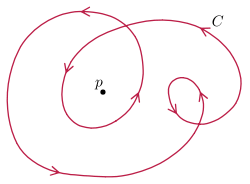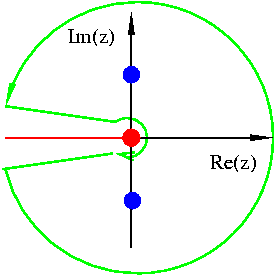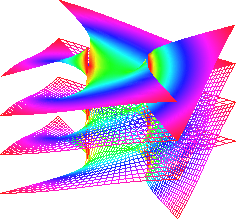|
Complex Analysis II
(15-Math-602) |
Riemann sphere, Möbius transformations, Cauchy-Riemann equations, Cauchy's Theorems & Integral Formulas, Argument Principle, The Residue Theorem, Riemann Mapping Theorem, Schwarz Christoffel Formula
|
Department of
Mathematical
Sciences |
|
|
|
|
|
This page is a work in progress! (Last revised 9 March 2010)
Instructor Prof David A Herron
810D Old Chem Bldg, 556-4075 |
My Office Hours
Mon, Wed 1:00-2:00 and by appt |
Links to pdf files for my class notes and a list of problems. |
Problem Session
Thursday 1:00-1:50 Seminar Room |
Textbooks
There are zillions of books about Complex Analysis available in the Geo-Math-Physics Library. I have put a number of these on open
reserve---if you check one out at the end of the day, you can keep it over night. Below is a short list of texts which I think are
pretty good. For the most part, I will follow Ahlfors. The books by Carathéodory are very geometric, which I quite like. The book
by Greene & Krantz is interesting and takes a novel approach. The books by McGehee and Palka are elementary with lotsa details presented.
The books by Greene & Krantz, McGehee, and Palka are all loaded with good problems.
| A |
Ahlfors |
Complex Analysis (third edition) |
| C |
Carathéodory |
Theory of Functions (of a complex variable) Vols. I & II (second edition) |
| GK |
Greene & Krantz |
Function Theory of One Complex Variable (second edition) |
| M |
McGehee |
An Introduction to Complex Analysis |
| P |
Palka |
An Introduction to Complex Function Theory |
General Syllabus
in A: chpt 4, 1-5, chpt 5, 1,5; chpt 6, 1,2; in GK: chpts 2-6, 8; in P: chpts IV-V, VII-IX
Course Goals
First and foremost, this is a course geared towards teaching you to think, act, and problem solve like a mathematician. Of particular importance, to me, is your acquiring the ability to communicate mathematical ideas effectively. This means learning how to read, and especially to write, mathematical proofs. We shall accomplish this in the guise of studying elementary complex analysis and the roots of geometric function theory. A subgoal, at least for some of you, is preparation for the preliminary PhD examination in complex analysis; I will have more to say about this in spring quarter (at which time I will run a prelim practice problem session).
Grades
Your final course grade will be determined from your performance on midterm exams, a final exam, your homework scores, and class and problem session participation. Roughly speaking, an A means your work is at the PhD level, a B indicates masters level work, and anything less describes work which is not at the graduate level.
Homework & Problem Session
I have a long list of suggested problems for you to solve. I plan to have a weekly hour long (90 minutes if possible:-) problem session. Here I will expect you, the students, to present solutions to certain of the homework problems. We can also talk about other problems and/or topics from the lectures. On the first day of class we will decide when to hold the problem session. I will also ask you write up and hand in solutions to certain exercises; these will be graded and returned to you. See below for due dates. I'll say more about this in class.
Problem Session Thursday 1:00-1:50 Seminar Room
Below I list information regarding: this week's hot topics, some suggested problems from Ahlfors, and homework.
4-8 Jan This week we learn a bunch of definitions and facts concerning paths and loops. Then we recall basic notions about real line integrals. Finally, we begin our study of complex line integrals.
11-15 Jan This week we examine Cauchy's Theorems: For a Rectangle, In a Disk, and modified versions of these. Then we establish Cauchy's Integral Formula For a Circle.
18-22 Jan This week we study Cauchy's Integral Formula For a Circle and use it to prove Cauchy's Integral Formulas for Derivatives For a Circle. These formulas will prove to be a powerful tool enabling us to establish many basic properties of holomorphic maps. We finish the week by discussing Cauchy type estimates, Morera's Theorem, Liouville's Theorem, the Fundamental Theorem of Algebra, and the modified form of Cauchy's Integral Formula For a Circle (that allows for exceptional points).
25-29 Jan This week we briefly review the modified form of Cauchy's Integral Formula For a Circle. Then we use it to prove Riemann's Extension Theorem. Then we give Goursat's proof of Cauchy's Theorem for a Rectangle. We end the week by beginning our discussion of sequences and series.
1-5 Feb This week we learn about normal convergence, Weierstrass' Theorem, Taylor series, and doubly infinite power series.
8-12 Feb This week we return to applications of the Cauchy Integral Formulas. First we see the Maximum Principle. Then we investigate Schwarz' Lemma and take another look at Möbius transformations of disks and half-planes. Then we have the MidTerm Exam.
15-19 Feb This week we begin an in-depth study of the topological properties of holomorphic maps. In particular, we prove the Identity Theorem, the Factor Theorem, and the Discrete Mapping Theorem.
22-26 Feb This week we continue our study topological properties of holomorphic maps and prove the Open Mapping Theorem. Then we turn our eyes to isolated singularities, the Factor Theorem for poles, and the Casorati-Weierstrass Theorem for essential singularities.
1-5 Mar This week we return to Cauchy theory! We start by studying the notion of winding number and see how it provides Cauchy Integral Formulas valid in Disks. Using this, we prove the Argument Principle.
8-12 Mar During our last week we investigate the Branched Covering Theorem.
Here are suggested problems for each indicated section in Ahlfors. In general you should try to solve all of the problems in Ahlfors, especially if you are planning to take the preliminary examination in Complex Analysis; but, be aware that some of Ahlfors' problems require some ingenuity. As I mentioned above, the other books also have many many good problems, many of which are routine.
- IV.1.1-3, Complex Line Integrals, pp.108-109:1-8
- IV.1.4, Cauchy's Theorem for a Rectangle
- IV.1.5, Cauchy's Theorem in a Disk
- IV.2.2, Cauchy's Integral Formula for a Circle, p.120:1-3
- IV.2.3, Cauchy's Integral Formula for Derivatives for a Circle, p.123:1-5
- IV.3.1., Riemann's Extension Theorem and Taylor's (first) Theorem, pp.124-126
- II.2.1-3, Sequences and Series, p.37:1-5
- II.2.4, Power Series, p.41:1-9
- V.1.1, Weierstrass's Theorem, p.178-179:1,2,3,5
- V.1.2, Taylor Series, p.184:1,3,4,5
- V.1.3, Laurent Series, p.186:1-3
- IV.3.4, The Maximum Principle and Schwarz' Lemma, p.136:1-5
- IV.3.2, Identity/Uniqueness Theorem, pp.126-127
- II.1.4, Rational Functions, p.32-33:2,4,5,6
- IV.3.2, Zeroes, Poles, and Essential Singularities, pp.127-9, pp.129-130:1-6
- IV.3.3, Argument Principle, Branched Covering Principle, and Open Mapping Theorem , p.133:1-4
Below is the assigned homework with due dates. (Here, again is a link to a pdf file for a list of these homework problems). The "Problems To Hand In" are to be written up and handed in before class on the indicated dates. The "Problem Session" problems will be discussed in that week's problem session. After the due date, you can find outlines for solutions (at least for some of the problems) by clicking the appropriate problem number.
| Due Dates |
Problems To Hand In |
Problem Session |
| 4,6,8 Jan |
First Day |
3 |
4 |
No Session |
| 11,13,15 Jan |
8, 10 |
12,14 |
17 |
5,6,7,9,11,13,15,16 |
| 18,20,22 Jan |
MLK Day |
18-20,30 |
28 |
5,9,22-27 |
| 25,27,29 Jan |
21,29,31 |
|
40 |
32-35,37,42,43 |
| 1,3,5 Feb |
36,38,39,41 |
|
45 |
44,46-50,52,53,55 |
| 8,10,12 Feb |
49,50,51,54,55 |
|
MidTerm |
MidTerm Review |
| 15,17,19 Feb |
56,63,64,66,67 |
|
|
58-62,65,68,69 |
| 22,24,26 Feb |
70-72,74,76 |
|
|
75,77,79,80,82,83,87 |
| 1,3,5 Mar |
78,81,84,85,86 |
|
|
82,83,87,88,90,91,92 |
| 8,10,12 Mar |
93,94,96,Ahlfors/p.130/(4,6) |
|
Final Review |
| 15 Mar |
Final Exam 11:30-4:00 |
1-107 |





